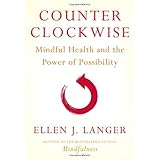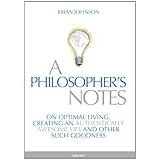
Average Reviews:

(More customer reviews)Michael Hogan, National University of Ireland, Galway: michael.hogan@nuigalway.ie
This review is based on my reading of all 4 of Ellen Langer's books, which I was inspired to read after meeting Ellen in Harvard recently.
--
Ellen Langer is one of the most vivacious women I have ever met. Upon arriving to meet her in Harvard's William James Hall, I was actually extremely ill, but mindlessly ignoring the symptoms. The painful and yet irrelevant swelling in my right leg and the weak and feverish state that led me to sleep through a very stimulating lecture by Daniel Dennett, was in fact a serious blood infection that would later result in my hospitalization. Little did I know that my conversation with Ellen Langer would be the thing that completely transformed my hospital experience from a potentially stressful, painful nuisance into a very interesting and rewarding experience. And notwithstanding the fact that I could hardly talk, in our short walk from Ellen's office to the Harvard clinic (where Ellen was going to get a cut in her hand seen to, the cause of which she transformed into a very interesting story) we designed three experiments and I experienced firsthand, in vivo, decades of research on social and developmental psychology, and on mindfulness, creativity and decision-making.
To understand the transformative power of Ellen Langer's perspective, and to better understand her creative action, I believe it is useful to experience firsthand her version of mindfulness -- the act of noticing new things -- which is actually very easy to practice, if for no other reason than it energizes and engages us and opens us to new possibilities. Further, it is useful to consider the way Langer applies her version of mindfulness to understanding of social psychology and developmental psychology phenomena, and science generally. Her thought, as laid out in her four books on mindfulness and in her many empirical papers, represents a veritable stream of understanding that liberates one from a constrained, passive, rigid view of reality, possibility, and human potential.
Noticing new things
Ellen and I both teach social psychology. A critical reading of social psychology reveals much to us about the conditions under which people impose rigid, stereotyped views upon themselves and other people, and the conditions under which behavior is a rigid function of contextual control [1]. What is often so startling to students who first discover social psychology research is just how rigid, stereotypical, and limited our worldviews and our behaviors often are. Nevertheless, every year, one or two students in my first year social psychology class approach with great excitement and tell me how inspired they are to discover all these human limitations so carefully catalogued by social psychologists. Awareness of the conditions shaping rigid, stereotyped thinking and action, they tell me, has actually liberated them. Some report feeling more open to experience, less rigid in their evaluation of self, other, and world. They report clearer perception, greater awareness of the subtle nuances of experience. They are noticing new things. They are energized and inspired. Some go a step further, extrapolating and anticipating the open field of possibilities: they report a transition from mindless acceptance of all that they know and feel and do, to mindful awareness of all that they can know and all that they can feel and can do. Their prior learning no longer dominates the way they interpret the present moment. The fullness of the present moment itself and the possibility space that opens by virtue of the fusion of present moment with the ineffable future moment infuse their field of action with a new radiance. All is new. The well-springs of creativity are open. Reality and potentiality comes flooding in.
Mindless reading of health-related information
Some students, I believe, remember the raw significance of their inspired insight as they progress to higher levels of ability and skill -- they remember to notice new things -- they remember mindfulness. It's a subtle change in thinking, says Langer, although not difficult to make once we realize how stuck we are in culture, language, and modes of thought that limit our potential. Social psychology education provides a wonderful opportunity to shed light upon mindfulness and mindlessness. Experimental social psychology is full of examples of the price people can pay for mindless learning, or mindless assimilation of their `culture'. Research by Chanowitz and Langer (1981), for example, demonstrates the negative consequences of mindless reading of medical information. They provided students with information booklets about a disorder called "chromosythosis", a condition that could lead to diminished hearing. Some of the students were told that 80% of the population had the disorder and they were asked to imagine how they might help themselves if they were diagnosed as having "chromosythosis". Another group was told that only 10% of the population had it, making the disease seem less relevant to them, and they were simply asked to read through the information booklets. All students were then tested to see if they had the disorder and all were told that, yes, they did indeed have it.
In the next phase of the experiment, participants were tested using a series of objective hearing tests. Those participants who were led to believe that the disorder was less relevant to them and who simply read through the information booklets, performed significantly worse on the hearing tests than the group who were led to believe that the disorder was potentially relevant to them and who also thought through the consequences of having the disorder. Langer describes this as one example of the negative effects of premature cognitive commitments. Specifically, when information is mindlessly received and accepted without critical question or creative `what if' deliberation, we run the risk of implicitly committing to a singular, rigid understanding of the information. When later we are faced with a situation where this `prior learning' is brought to bear on our action in context, we may find ourselves functionally constrained by the rigid understanding we have implicitly established. Mindless reading and mindless learning result in mindless reactivity.
Mindful Health and the power of possibility
Langer considers how mindfulness operates when people learn that they have cancer. Although science is learning that cancer can be a chronic condition or even fully treatable, most of us, says Langer, mindlessly assume that cancer is a "killer". Rather than being mindfully aware of our symptoms and the conditions associated with the presence and absence of symptoms at any given moment in time, rather than being mindfully aware of the variable nature of our interactions with medical professionals, friends, and family, or changes in the way we work and play, and so on, one possible outcome is that the trauma associated with the diagnosis of cancer leads us to identify fully with the label "cancer patient". As soon as we identify with the label, all the preconceived ideas we ascribe to the label come to control our behavior.
But this is only one possibility and not everyone responds in the same way when diagnosed with cancer. Langer refers to research by Sarit Golub (2004) conducted in Harvard. Golub found that while some people diagnosed with cancer add cancer to their identity, others let the diagnosis take over their identity, with the latter group faring less well on measures of recovery and psychological well-being.
Langer suggests that mindfulness makes us more optimistic because we are open and attentive to possibilities, and that this in turn facilitates recovery. Research does suggest a relationship between mindfulness and optimism [2], and between optimism and recovery from coronary artery bypass surgery [3]. Converse to the view that optimists have a rosy view of their future that invariably leads them to ignore their present circumstances, Langer believes that mindful optimists are likely to pay greater attention to their recovery than do pessimists, and in so doing they aid the recovery process and help anticipate complications.
Nevertheless, mindless optimism and mindless pessimism may lead people to invest more heavily in positive or negative systems of belief than in reality itself and the possibilities that reality presents [4]. Thus, mindful optimism is unique: optimal well-being, according to some, hinges on a capacity to open oneself to the subtleties and complexities of reality and thus inhibit cognitive commitments that pit belief against experience [5]. One belief that Langer asks us to be mindful of in this context is the belief that science trumps experience. If, for example, we blindly assume that medical science is simply better than our own experience in informing our judgment and action, we may be inclined to mindlessly hand over control of our health to the `experts' and thus ignore the subtle variation in our experience (e.g., our experience of symptoms) and contextual variables that impinge upon our experience. Again, by accepting some label attached to us in consultation with a doctor (e.g., "chronic pain patient") we may come to assume more stability in our condition than there is; we may hand over control of our condition to others, and thus negate the possibility space that opens to us when we are mindfully aware of our condition.
Mindful awareness of our state can enhance our ability to control our state. For example, Delizonna, Williams, and Langer (2009) demonstrated that, when compared with a group who were asked to measure...Read more›
Click Here to see more reviews about:
Counterclockwise: Mindful Health and the Power of PossibilityIf we could turn back the clock psychologically, could we also turn it back physically? For more than thirty years, award-winning social psychologist Ellen Langer has studied this provocative question, and now, in Counterclockwise, she presents the answer: Opening our minds to what's possible, instead of presuming impossibility, can lead to better health–at any age. Drawing on landmark work in the field and her own body of colorful and highly original experiments–including the first detailed discussion of her "counterclockwise" study, in which elderly men lived for a week as though it was 1959 and showed dramatic improvements in their hearing, memory, dexterity, appetite, and general well-being–Langer shows that the magic of rejuvenation and ongoing good health lies in being aware of the ways we mindlessly react to social and cultural cues. Examining the hidden decisions and vocabulary that shape the medical world ("chronic" versus "acute," "cure" versus "remission"), the powerful physical effects of placebos, and the intricate but often defeatist ways we define our physical health, Langer challenges the idea that the limits we assume and impose on ourselves are real. With only subtle shifts in our thinking, in our language, and in our expectations, she tells us, we can begin to change the ingrained behaviors that sap health, optimism, and vitality from our lives. Improved vision, younger appearance, weight loss, and increased longevity are just four of the results that Langer has demonstrated.Immensely readable and riveting, Counterclockwise offers a transformative and bold new paradigm: the psychology of possibility. A hopeful and groundbreaking book by an author who has changed how people all over the world think and feel, Counterclockwise is sure to join Mindfulness as a standard source on new-century science and healing.
 Get 34% OFF
Get 34% OFF
Click here for more information about Counterclockwise: Mindful Health and the Power of Possibility







